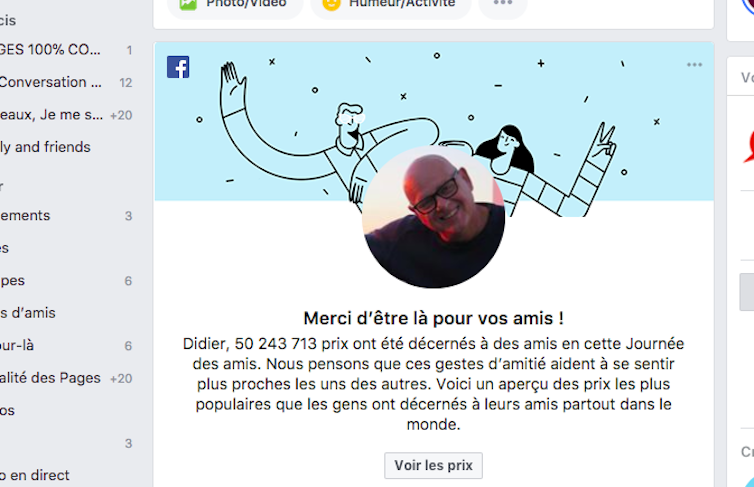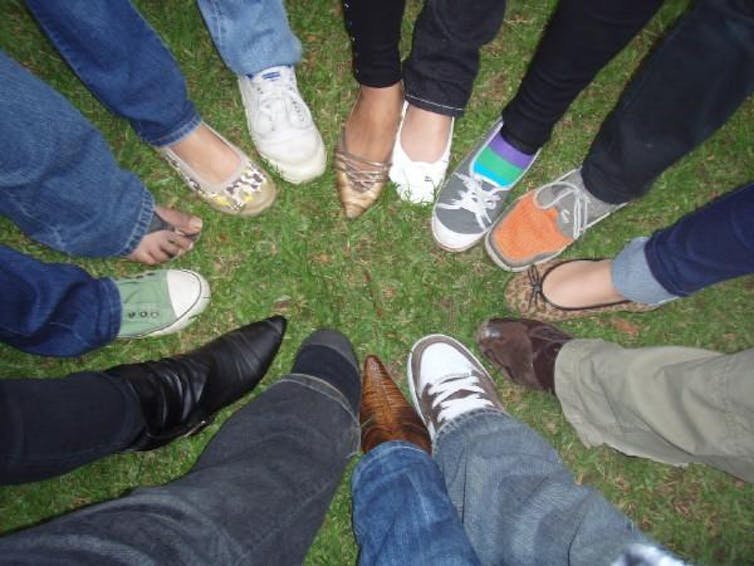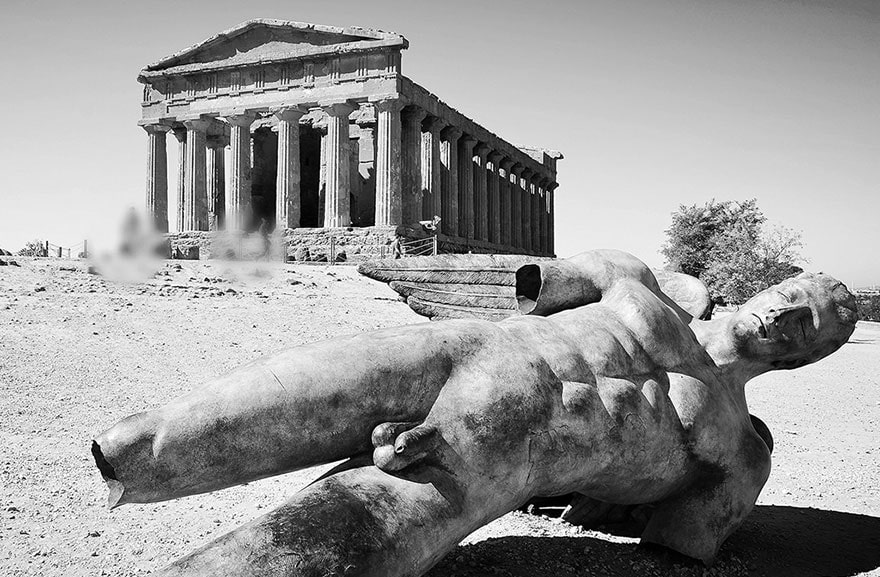Sdid you know that February 5th was Friends Day? According to what official calendar will you ask me, if you are not connected to Facebook. If you are, then you know that when you opened your application, this is what jumped out at you:
At the top of the Facebook page.
Thank you for being there for your friends!
In Maz, 37,628,836 prizes were awarded to friends on Friends' Day. We believe that these gestures of friendship help us to feel closer to one another. Here's an overview of some of the most popular prizes that people awarded to friends around the world. "Maz, we believe that every friendship is unique. On Friends' Day, we hope you will appreciate the opportunity to give your friends a few awards to show them what they mean to you. »
I don't know how to put it. How can I express the astonishment and fear that this injunction inspires in me, which is at once a recommendation, a threat, but also an instruction manual, a ready made, and a normative constraint.
Short explanation of text.
"Thanks for being there for your friends" sounds a little like "Thanks for holding the door" when you just got it in your face. For one thing, it's engaging. And who's talking to me like that? Someone who probably knows me because he calls me by my first name. Immediately, and because it is possible that I am badly composed, I am reassured that "37,628,836 prizes have been awarded".
If I follow the reasoning - to consider that there is one, but I doubt that He or We were born yesterday - I am thanked for being there for my friends, and as today there are an almost incalculable number - except that it is calculated - of prizes that have been awarded to friends, then I must award some in my turn. Why do I have to do that? The law of numbers.
The law of numbers
The number of "friends" who show friendship. The number proves it: it's long, and big, and impressive, and not even rounded (which means not faked?). It would have been even longer, and bigger, and more impressive, and even rounded up (it will get bigger every day, because Friends' Day goes on forever), nobody would have questioned such an accounting, for two reasons: apart from a calculating machine matching the application that proposes to give prizes to friends, nobody would have the idea of counting; moreover, how to check? And with whom? We? He? Facebook? The one who calls you by your first name with big eyes: you didn't award any prizes to your friends today. No, damn it, I forgot.
Yet I'm used to classify my friends and make them pass interior tests, then line them up on an imaginary line and fire the shot to see who will come first, I like to make podiums and rankings, with accessits, and special jury prizes. When there's a tie, I hesitate, and that's where Facebook makes it easy for me by customizing the prizes.
Or rather by offering me not to customize them, but "customizations" already made from all over the world, to see if one of them would suit me. Facebook sells me (without an invoice) "customizations", i.e. products, which would allow me to declare my friendship perfectly singular, oops, no, to award prizes.
What's in it for us?
What price is that, you may ask, and what is meant by price. Here are a few examples: the first prize is awarded to "Never a dull moment" with 6,435,892 votes, followed by "Heart on my hand", then "Supports me in all circumstances", "Love to spare", and in fifth place "Publishes the best content"!
If we hadn't already talked about "friendship day", we would have thought that we were competing for the most outdated clichés, or the most agreed-upon phrases, precisely those that I wouldn't want to receive from a friend for anything in the world. But no, it is indeed these "prizes", which are in fact the most repeated, the most "sent", the most "shared", sentences that go everywhere, erasing cultural differences, since from Uruguay to Japan via Pakistan, one sends "the heart on the hand". This is sad news for poetry.
Language is no longer used to poeticize, nor to create a singular bond (one waits for the declaration of love made by Facebook). However, the fifth prize stands out: after listing nonsense and nameless banalities, a rather innovative definition of best friend emerges: "publishes the best content". Admittedly, this phrase does not mean anything out of context. You can't say all that jitters in a conversation over a drink, "He was my best friend," but why, what was so special about him? What made you get along so well, what did you share? "And you say, "He was posting the best content."
It is therefore a definition of friendship that is contextualized, but even more so, relative to the only context that gave birth to it: namely the network that functions only through the content that each person "publishes". And again, content is a big word, publishing something is enough to talk about content: content only means that a publication has an object, however spurious or anecdotal it may be.
Contents
The important thing is to publish, which is the only way to exist on Facebook. The proof is in the fifth prize, that is to say the fifth most sent sentence on Friendship Day. And we can well imagine that it has not been addressed 2,692,163 times to the same person: each time, we can therefore assume that it refers to a different content. Where we see that the content is quite contingent in the story.
So Facebook allows the Friendship Award to be given by dedicating the phrase "publish the best content", which is a kind of tautology, since sending someone the best content means naming them "Facebook" best friend, given that the very definition of "friend" on Facebook is to publish content. CQFD. Facebook awards itself prizes.
And indeed Facebook would like friendship to be the most powerful source of social networking, since it is its raison d'être. "Friendship" in the Facebook sense. Being connected is enough: from then on, you call yourself a "friend", and the members of the community do the same.
The first prize therefore opens the most shared definition of friendship with "never a dull moment" and concludes with "publishes the best content". And no doubt this has something to do with the fact that you never get bored when you're on Facebook.
All friends!
The logic of networks
Friendship has been sold off in the network market, legitimizing from an almost moral point of view the vitality of the connections. This shift from the social bond, which has only virtual networking as its social basis, and which therefore has little to do with society in its traditional sense, to the realm of the affective, of feelings, of intimacy, and of a certain form of commitment, shows the accomplishment of unravelling, of atomization ; but also the fact that nothing escapes the system in which the network is worth more than human relations, even overrides those that constitute the network, since they are referred to simple interconnected points and have meaning only in relation to the whole : the whole being nothing more than an algorithmic model and not a community of thinking beings, or even "political animals".
These points, which we call "friends", we appeal to their loyalty, their fidelity, we try to give them back their humanity through injunctions such as that of awarding prizes to their friends, thereby enhancing their own status: all friends, and some better than others with regard to their publications. And how do we remember their publications? Is it a general appreciation, a vague feeling? Has the entire history been reviewed to assess the quality of the content?
Facebook does it for you: it has calculated the number of "likes", and offers you to give this award to the one to whom you have given the most thumbs up: usually your sister, or your press agent who spins on the networks the release of your latest work, and as Facebook is above all a promotional tool of all kinds, you tend to "like" what can be favorable to you. The "like" being the invention of Facebook, it is indeed Facebook that defines what it is to be a good friend by means of its own instruments.
Facebook, like the United Nations, has decreed Days. These days (Women's Day, Slavery Day, Indigenous Peoples' Day...) are not supposed to be self-promotional, as if the United Nations was justly promulgating the Day of the Nations. Facebook is not afraid of redundancy or contradiction.
When awarding prizes, you enter the race to win the best customization of the prize; and how will it be elected? By the number of friends who will have used it. The most used personalization makes the friend who invented it the best friend there is (imagine, "heart on hand" - that's a personalization shared nearly five million times).
Like!
Doing your job as a friend
Thus, a definition of friendship is taking shape: the friend is the one who meets all the prerequisites of Facebook friendship, i.e. who "like", shares, in short, does his job as a friend, who finds the most sharable formula (and therefore precisely the least singular), and who, to do so, must finally erase all personal traces to create a personalization that is recognized by all (i.e. used, because recognition and use are then synonymous).
And one wonders: but what is a "most shared" personalization? This is a mathematical as well as a metaphysical problem. And why should I use the personalization of a "friend" I don't know, to send it to a "friend" I know? Because how can I understand the logical connection between these two successive sentences: "Here is an overview of the most popular awards that people have given to their friends all over the world. "and "Maz, we believe that every friendship is unique. »
The evacuation of Being
Has the logic of the social network definitively rendered the Aristotelian logic and more generally the logos based on the principle of non-contradiction obsolete? Dominique Quessada was concerned about this in his Short treated with altricide :
"We are witnessing the collapse of a grammar initiated by Greek metaphysics: a monovalent ontology (according to which Being is and non-Being is not) associated with a bivalent logic based on division (according to which True is not false and False is not true)" ; or again "The emergence of the figure of the Slave-Master [fusion of master and slave] was made possible by a non-dialectical overcoming of the dialectical framework itself, thus by the ruin of the main framework carrying language and ontology - as if dialectics, progressively paralyzed, in search of matter to grind, had attacked its very principle, thus causing a disjunctive movement, by which it saw itself overwhelmed and defeated, and a solution of continuity whose emptiness called for the necessity of a new logic of Being. »
Certainly, but here, the logic of Being resembles both the evacuation of Being in favor of the networked system, and the formatting whose logic refers to control and profit: the proof, 37,628,836 "friends" have been controlled. By sending their personalized prizes, they have activated the network that rewards them by counting them.
And in this accounting a new normativity is emerging, different and yet similar to administrative questionnaires where the questions necessarily decide the answers (and where it is always very difficult to answer if one does not belong to a given social class/occupation/nationality, i.e. determined by the form).
The School of Athens, fresco by Raphael, exhibited in the Signature Chamber (the Stanze) of the Vatican Museums. In the Plato and Aristotle Center. wikipedia
Be part of the "community" of friends
In the same way Facebook offers formulas at your disposal: show your friendship by sending a prize to be part of the greatest number, don't stay on the sidelines, show others that you are a good friend.
From now on, friendship is part of these predefined social categories, not to say that they have the ambition to define categories of Being.
And to be part of the community, you have to give out awards that are themselves predefined. Predefined not by an identifiable power, but by other Internet users who have already answered the call and ticked all the boxes on the exemplary friend form invented by Facebook, in other words, by the new normativity that takes the ultimate figure of personalization and interferes in the most political and human relationship since the beginnings of philosophy: friendship.
For Aristotle, friendship (philia) is a virtue, which means that it is both a practice and an end in itself.
"It seems ... that friendship and justice relate to the same objects and have common characteristics. In any association there seems to be justice and therefore friendship. At least the names of friends are given to those who are shipmates and comrades in arms, as well as to those who find themselves together as a group in other circumstances. The measure of association is that of friendship and also of law and justice. The proverb is also true that among friends all things are common', because it is in the community that the most important things are shared. that friendship manifests itself. »
Facebook could subscribe, but friends are no longer brothers in arms, but accounts with identifiers. They only share connections.
Friendship is now mediatized, and by this means reinvented by Facebook, which enjoins the friend to send a prize to the other friend. Friendship penetrates the field of competition, and frees itself from any attachment to what made it a prize (not the one awarded, but the symbolic one).
Facebook seeks to redefine the foundations of politics through a new anthropology that involves friendship. Politics that has as its key to intelligibility only the economic, provided that the anthropos is emptied of all substance to become only an agent of competition and consumption, a visible agent in profile, but without Being since it has no face.

The original text of this article was published on The Conversationeditorial partner of UP' Magazine
READ UP : Friendship: Facebook and Aristotle
Anything to add? Say it as a comment.
















